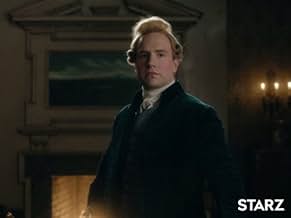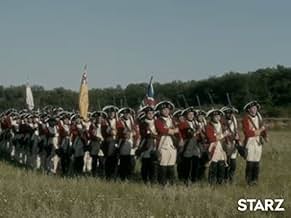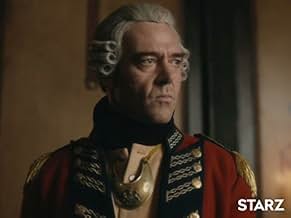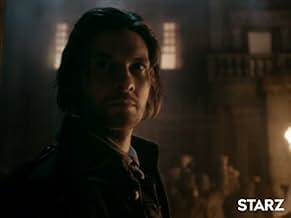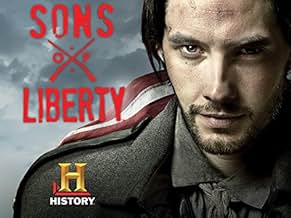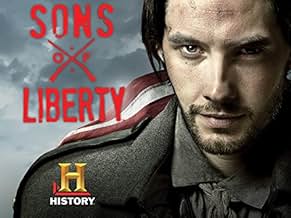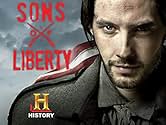Ajouter une intrigue dans votre langueThe story of a group of very different men fighting in the American Colonies for freedom, and how they will shape the future for the United States of America. Based on true stories.The story of a group of very different men fighting in the American Colonies for freedom, and how they will shape the future for the United States of America. Based on true stories.The story of a group of very different men fighting in the American Colonies for freedom, and how they will shape the future for the United States of America. Based on true stories.
- Prix
- 2 victoires et 7 nominations au total
Parcourir les épisodes
Avis en vedette
This miniseries is entertaining as a drama if you can set aside its various gross historical inaccuracies. So, pretend that it portrays the American Revolution in an alternate dimension, perhaps even pretend that it's a prequel to "Abraham Lincoln: Vampire Hunter," and you'll do much better that way. But, if instead you insist on expecting that its writers were objective wherever possible, keeping away from bias when none was required, then crawl back underneath your rock, please, because that has never been the History Channel's dealing. And this time, take a moment while you're down there to appreciate what a great name for a propaganda mill, "The History Channel" really is; it almost may as well call itself "The Ministry of Truth." What is most obvious and transparent about this miniseries' disinterest in truth is its disinterest in history.
I just rewatched this mini-series and think I enjoyed it more the 2nd time.
This time I had the op to do some reading regarding his historical accuracy. For a series on the network it originally aired, I would believe that it should have been far more accurate. There are not nearly enough goofs for all the inaccuracies.
I have to ignore the inaccuracies because otherwise I would be very unhappy.
What the show did do is I hope give some people, the vast majority of people, a little understanding for the origins of our country. One can see the rationale for the majority of the Bill of Rights including the 2nd Amendment. So many people believe that the 2nd Amendment is primarily for self-protection where it really was for self-protection against the government. Other things include freedom of speech, stopping the govt from just taking property, freedom of press, etc.
I would have loved for there to be a follow-up that covered the Rev War although the recent GW miniseries may have (haven't watched it yet).
We truly need to remember all the founders of this country. Did they have some faults (slavery, womanizing, etc), but they were also very brave men that risked everything without which we would never have had the United States.
This time I had the op to do some reading regarding his historical accuracy. For a series on the network it originally aired, I would believe that it should have been far more accurate. There are not nearly enough goofs for all the inaccuracies.
I have to ignore the inaccuracies because otherwise I would be very unhappy.
What the show did do is I hope give some people, the vast majority of people, a little understanding for the origins of our country. One can see the rationale for the majority of the Bill of Rights including the 2nd Amendment. So many people believe that the 2nd Amendment is primarily for self-protection where it really was for self-protection against the government. Other things include freedom of speech, stopping the govt from just taking property, freedom of press, etc.
I would have loved for there to be a follow-up that covered the Rev War although the recent GW miniseries may have (haven't watched it yet).
We truly need to remember all the founders of this country. Did they have some faults (slavery, womanizing, etc), but they were also very brave men that risked everything without which we would never have had the United States.
There has been a tendency lately to "upgrade" works set in historical times be they fictional or true. Operas and plays written 100 and more years ago which take place in Europe during centuries past are being put into places like Las Vegas and California. Even Shakespeare has not been immune from updated versions of his plays, such as the film Richard III in which the medieval king is portrayed as a high-ranking British fascist of the 1930's! The trend is now infiltrating film productions which are supposed to take place in historical settings. One of the worst such productions was the recent HBO "The Tudors". The present History Channel offering of "The Sons of Liberty" is another such offering. At the same there are some good things in the series.
While there is much to be praised about this production, including wonderful sets and effects, the dialog and mannerisms of the characters are so 21st century I kept being reminded that the production was from the 2000's. A good period piece allows the audience to be transported, albeit temporarily, to another time where manners and culture were quite distinct from today. In 18th century Britain and America, class distinctions were highly pronounced and obvious. Working class adults would refer to any of the aristocracy as "sir" or "madam". There would even be the occasional bow from working class males and curtsies engaged by working class women to members of the aristocracy. Working class children would refer to any adult male as "sir", and more than likely, children were told to do things, not asked.
The present production, trying too desperately to appeal to 21st century American sensibilities, throws much of the formalities and mannerisms of 18th century life out the window in favor of more casual interactions. A young boy among the Sons of Liberty is often "asked" to do things, much like they are today, but children were ordered around. And working class children in this production don't use the formal "sir" enough. If an adult wished a child to engage in a task, it was expected to be done, not "would you please..." The expected interaction would be "Do this" with the response "right away, sir." Now, we can debate about whether this kind of treatment was unfair, but that's how it was in the 18th century. Also, working class members would be very formal towards superiors except in private conference.
In an interesting scene, John Hancock throws a party for the birthday of King George III, which was common for colonists and other subjects of Britain. (The custom still occurs today in Britain.) During the party, John Hancock walks and chats with then Lieutenant Governor Hutchinson who ranked just below the governor of Massachusetts and New Jersey who ruled at the behest of Britain and the King. (In a sense, the governor was the voice of the king.) In this context, Hutchinson would definitely be Hancock's superior although both were part of the aristocracy of the colonies. Several times, Hancock turns his back on the lieutenant governor to say hello to other arrivals. This would have been considered a gross faux pas by 18th century standards. You would never turn your back on a ranking official, even a lieutenant governor, in a social occasion to speak to others. You would ask permission to do so, and others would not interrupt if you were in conference with a superior. In other scenes, I heard people saying the epithet "bs", which I don't think existed at that time. People did swear, but never to those of higher rank and certainly not in mixed company.
The most interesting aspect of the series has to do with the behind-the-scenes business deals. These are what the Sons of Liberty did to avoid taxation. Still worth watching but I would have liked the filmmakers to consult with some historians concerning the correct manners and culture of the time. The HBO Series "John Adams" is much more accurate in this regard. This is after all supposed to be a presentation from the History Channel. Why not be as accurate possible, unless executive are worried that younger viewers won't "identify with it? Better than "The Tudors" but not as a good as "John Adams".
While there is much to be praised about this production, including wonderful sets and effects, the dialog and mannerisms of the characters are so 21st century I kept being reminded that the production was from the 2000's. A good period piece allows the audience to be transported, albeit temporarily, to another time where manners and culture were quite distinct from today. In 18th century Britain and America, class distinctions were highly pronounced and obvious. Working class adults would refer to any of the aristocracy as "sir" or "madam". There would even be the occasional bow from working class males and curtsies engaged by working class women to members of the aristocracy. Working class children would refer to any adult male as "sir", and more than likely, children were told to do things, not asked.
The present production, trying too desperately to appeal to 21st century American sensibilities, throws much of the formalities and mannerisms of 18th century life out the window in favor of more casual interactions. A young boy among the Sons of Liberty is often "asked" to do things, much like they are today, but children were ordered around. And working class children in this production don't use the formal "sir" enough. If an adult wished a child to engage in a task, it was expected to be done, not "would you please..." The expected interaction would be "Do this" with the response "right away, sir." Now, we can debate about whether this kind of treatment was unfair, but that's how it was in the 18th century. Also, working class members would be very formal towards superiors except in private conference.
In an interesting scene, John Hancock throws a party for the birthday of King George III, which was common for colonists and other subjects of Britain. (The custom still occurs today in Britain.) During the party, John Hancock walks and chats with then Lieutenant Governor Hutchinson who ranked just below the governor of Massachusetts and New Jersey who ruled at the behest of Britain and the King. (In a sense, the governor was the voice of the king.) In this context, Hutchinson would definitely be Hancock's superior although both were part of the aristocracy of the colonies. Several times, Hancock turns his back on the lieutenant governor to say hello to other arrivals. This would have been considered a gross faux pas by 18th century standards. You would never turn your back on a ranking official, even a lieutenant governor, in a social occasion to speak to others. You would ask permission to do so, and others would not interrupt if you were in conference with a superior. In other scenes, I heard people saying the epithet "bs", which I don't think existed at that time. People did swear, but never to those of higher rank and certainly not in mixed company.
The most interesting aspect of the series has to do with the behind-the-scenes business deals. These are what the Sons of Liberty did to avoid taxation. Still worth watching but I would have liked the filmmakers to consult with some historians concerning the correct manners and culture of the time. The HBO Series "John Adams" is much more accurate in this regard. This is after all supposed to be a presentation from the History Channel. Why not be as accurate possible, unless executive are worried that younger viewers won't "identify with it? Better than "The Tudors" but not as a good as "John Adams".
To many historical inaccuracies, and too much use of modern idioms for my taste. John Adams was a much better miniseries.
Very few movies or shows about this period of history so if you're interested it's worth watching. But if you are a history buff you'll be more irritated as the lack of historical accuracy and detail in a show produced by the history channel... almost like then didn't actually bother to learn it before making.
Casting is poor, many of the actors are inaccurately cast for the age of the person
Uniforms, formations, mannerisms, field commands, etc for the redcoats are pure fiction other than their red jackets. At one point general gage (who was 55 at the time yet played by a much younger actor) use the command "rapid fire" to describe the artillery bombardment of bunker hill. Rapid fire 🙄
Much of action is too stylized and martial arts style and does not resemble combat of the era.
The battle of Lexington and concord are a joke at best. Basically no display of the action at concord bridge and nothing of the patriots constant harassment of the British march back to Boston.
No details or depiction of the setting or scale or layout of the combat in the show.
General Washington is depicted as a war mongering tough guy who volunteers himself for commander in chief position when in reality he was nominated for the position and reluctantly accepted.
John Hancock is depicted as a faggy dandy with little to no backbone when in reality he was a savvy rich merchant and respected in the community.
No historical basis of general gages wife sleeping with dr warren. Totally made up bs that doesn't add anything to the story and appears to only be added so a female character could be included.
Any true American Revolutionary War fans or history nuts may wanna skip this mildly entertaining but historically lazy and irritating slap in the face to a great American story.
The history channel should be embarrassed of this. Embarrassed.
Casting is poor, many of the actors are inaccurately cast for the age of the person
Uniforms, formations, mannerisms, field commands, etc for the redcoats are pure fiction other than their red jackets. At one point general gage (who was 55 at the time yet played by a much younger actor) use the command "rapid fire" to describe the artillery bombardment of bunker hill. Rapid fire 🙄
Much of action is too stylized and martial arts style and does not resemble combat of the era.
The battle of Lexington and concord are a joke at best. Basically no display of the action at concord bridge and nothing of the patriots constant harassment of the British march back to Boston.
No details or depiction of the setting or scale or layout of the combat in the show.
General Washington is depicted as a war mongering tough guy who volunteers himself for commander in chief position when in reality he was nominated for the position and reluctantly accepted.
John Hancock is depicted as a faggy dandy with little to no backbone when in reality he was a savvy rich merchant and respected in the community.
No historical basis of general gages wife sleeping with dr warren. Totally made up bs that doesn't add anything to the story and appears to only be added so a female character could be included.
Any true American Revolutionary War fans or history nuts may wanna skip this mildly entertaining but historically lazy and irritating slap in the face to a great American story.
The history channel should be embarrassed of this. Embarrassed.
Le saviez-vous
- AnecdotesFilmed entirely in Romania.
- GaffesThe British flag depicted in the miniseries is historically incorrect. The flag shown didn't exist until 1806 (the union with Ireland).
- ConnexionsReferenced in Chelsea Lately: Episode #8.109 (2014)
Meilleurs choix
Connectez-vous pour évaluer et surveiller les recommandations personnalisées
- How many seasons does Sons of Liberty have?Propulsé par Alexa
Détails
Contribuer à cette page
Suggérer une modification ou ajouter du contenu manquant

Lacune principale
By what name was Sons of Liberty (2015) officially released in India in English?
Répondre



